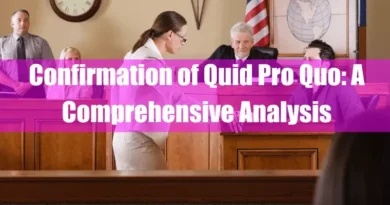Is Quid Pro Quo Illegal In Business?
In business, “quid pro quo” refers to an exchange where one thing is given in return for another. Such exchanges are not inherently illegal and are common in many business transactions. However, they become illegal when they involve unethical or unlawful activities, such as bribery or coercion. For instance, offering a job promotion in exchange for sexual favors constitutes quid pro quo sexual harassment, which is prohibited under laws like Title VII of the Civil Rights Act of 1964. Similarly, exchanging donations for favorable actions can be considered bribery in political contexts. Therefore, while quid pro quo arrangements are legal in many business scenarios, they cross into illegality when they involve unethical or unlawful conduct.
Takeaways
| Key Points |
|---|
| Quid pro quo arrangements are common and legally foundational in business, encompassing lawful exchanges such as companies paying vendors or consultants offering services for fees, all governed by contract law through the principle of mutual consideration. |
| These arrangements become unlawful when involving bribery, coercion, or exploitation, such as offering money to officials for favorable treatment, pressuring someone under threat, or engaging in sexual harassment tied to job benefits—each violating laws like the Foreign Corrupt Practices Act, the Federal Bribery Statute, and Title VII of the Civil Rights Act of 1964. |
| Ethical considerations further distinguish acceptable practices from exploitative ones; transparency, consent, and fairness are essential, while leveraging power imbalances for personal gain is deemed unethical and damaging. |
| High-profile legal cases, such as the overturned conviction of Governor Bob McDonnell and workplace harassment lawsuits, highlight the legal and moral complexities surrounding quid pro quo conduct. |
| Enforcement is carried out by agencies like the DOJ, SEC, and EEOC, which aim to uphold legal standards and protect the integrity of business and employment environments. |
Introduction
Definition of “Quid Pro Quo”
“Quid pro quo” is a Latin phrase meaning “something for something.” In business, it refers to an exchange where one party provides a good, service, or favor in return for something of equivalent value from another party. This concept is foundational in contractual agreements, ensuring that each party offers consideration to validate the contract.
Common Usage in Business Contexts
In everyday business operations, quid pro quo arrangements are standard. Examples include a company paying a vendor for supplies or a consultant providing expertise in exchange for a fee. These transactions are legal and form the backbone of commercial activities.
Legal Framework
When Quid Pro Quo is Legal
Standard Business Transactions
Quid pro quo is legal when it involves mutual agreements where both parties consent to the exchange. For instance, a retailer purchasing products from a wholesaler at an agreed price is a lawful quid pro quo transaction. Such exchanges are governed by contract law, which requires that each party provides something of value.
Contractual Agreements
In legal terms, the concept of consideration—something of value exchanged between parties—is central to contract formation. Quid pro quo arrangements fulfill this requirement, making contracts enforceable. For example, in a merger agreement, an earn-out clause may stipulate that the seller receives additional compensation if certain performance targets are met, representing a lawful quid pro quo.
When Quid Pro Quo is Illegal
Bribery and Corruption
Quid pro quo becomes illegal when it involves bribery or corrupt practices. For example, offering money to a government official in exchange for favorable treatment constitutes bribery, a criminal offense. Such actions undermine fair competition and are prohibited under anti-corruption laws.
Sexual Harassment in the Workplace
In employment law, quid pro quo sexual harassment occurs when job benefits are conditioned on sexual favors. This form of harassment is illegal under Title VII of the Civil Rights Act of 1964. Employers are liable if supervisors engage in such conduct, as it creates a hostile work environment and violates employees’ rights.

Coercion and Extortion
Quid pro quo arrangements involving coercion or extortion are unlawful. If one party uses threats or undue pressure to obtain something of value from another, the exchange is not consensual and violates criminal statutes. Such practices are prosecuted to protect individuals and maintain ethical standards in business dealings.
Ethical Considerations
Distinguishing Ethical vs. Unethical Practices
While many quid pro quo arrangements are legal, ethical considerations play a crucial role in business practices. An exchange is ethical when it is transparent, consensual, and benefits all parties involved. Conversely, if an arrangement exploits power imbalances or lacks informed consent, it is deemed unethical. For instance, a manager offering a promotion in return for personal favors exploits their position, making the exchange unethical even if not explicitly illegal.
Impact on Business Reputation
Engaging in unethical quid pro quo practices can severely damage a company’s reputation. Public exposure of such dealings may lead to loss of customer trust, employee dissatisfaction, and legal consequences. Maintaining ethical standards in all exchanges is essential for long-term success and credibility in the business community.
Quid pro quo arrangements are integral to business operations, facilitating mutual exchanges that drive commerce. While many such arrangements are legal and ethical, crossing into bribery, coercion, or exploitation renders them illegal and unethical. To maintain integrity and public trust, businesses must ensure their practices adhere to legal standards and ethical norms.
Case Studies
Legal Quid Pro Quo Examples

In business, quid pro quo arrangements are often legal when they involve mutual agreements where each party provides something of value. For instance, a company may enter into a contract with a supplier, agreeing to purchase a certain volume of goods in exchange for discounted pricing. Such agreements are standard in commercial transactions and are enforceable under contract law, provided they meet legal requirements such as mutual consent and lawful consideration.
Illegal Quid Pro Quo Examples
However, quid pro quo becomes illegal when it involves unethical or unlawful exchanges. A notable example is the case of former Virginia Governor Bob McDonnell, who was indicted for accepting over $175,000 in gifts from a businessman in exchange for promoting the businessman’s product. The legal debate centered on whether McDonnell’s actions constituted “official acts” required to prove corruption. The Supreme Court ultimately overturned his conviction, highlighting the complexities in defining and prosecuting quid pro quo corruption.
Another example involves workplace sexual harassment, where a supervisor demands sexual favors from an employee in exchange for job benefits. Such conduct is illegal under laws like Title VII of the Civil Rights Act of 1964. In a recent case, a former employee at a custom gift retailer alleged that her supervisor engaged in quid pro quo harassment, demanding personal favors in return for professional advancement.
Regulatory Guidelines
Overview of Relevant Laws and Regulations
Various laws govern the legality of quid pro quo arrangements. The Foreign Corrupt Practices Act (FCPA) prohibits companies from bribing foreign officials to gain a business advantage in the United States. Domestically, the Federal Bribery Statute (18 U.S.C. § 201) criminalizes the exchange of anything of value for official acts. Additionally, Title VII of the Civil Rights Act addresses employment discrimination, including quid pro quo sexual harassment. These laws aim to maintain ethical standards and prevent abuses of power in various sectors.
Role of Enforcement Agencies
Enforcement of these regulations involves multiple agencies. The Department of Justice (DOJ) and the Securities and Exchange Commission (SEC) are responsible for investigating and prosecuting violations of the FCPA. The Equal Employment Opportunity Commission (EEOC) handles complaints related to workplace discrimination and harassment. These agencies work to uphold legal standards and protect individuals and organizations from unethical practices.
Best Practices for Businesses
Implementing Clear Policies
Businesses should establish clear policies outlining acceptable conduct to prevent illegal quid pro quo arrangements. These policies should define prohibited behaviors, such as offering or accepting bribes, and provide guidelines for ethical decision-making. Regularly reviewing and updating these policies ensures they remain effective and relevant.
Training and Awareness Programs
Employee training is essential in promoting an ethical workplace culture. Regular workshops and seminars can educate staff about legal requirements and company policies regarding quid pro quo arrangements. Training should emphasize the importance of integrity and the consequences of unethical behavior.
Reporting Mechanisms
Establishing confidential reporting systems allows employees to report suspected unethical conduct without fear of retaliation. Whistleblower policies and anonymous hotlines can encourage individuals to come forward with concerns, enabling organizations to address issues promptly and effectively.
Conclusion
Quid pro quo arrangements are a common aspect of business transactions, facilitating mutual exchanges that drive commerce. However, when such arrangements involve unethical or illegal activities, they can lead to serious legal consequences and damage an organization’s reputation. By understanding the legal framework, implementing robust policies, and fostering an ethical culture, businesses can responsibly navigate quid pro quo situations and maintain integrity in their operations.









